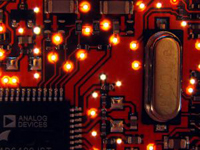Wrestling With E-Waste
 Globe-Net - Consumers are an ephemeral bunch. They love their television sets, cell phones, computers, MP3 players and any other electronic equipment that enriches their daily lives. Yet they throw them away with such abandon that 50 million tons ends up discarded every year around the world, according to the United Nations Environment Programme.
Globe-Net - Consumers are an ephemeral bunch. They love their television sets, cell phones, computers, MP3 players and any other electronic equipment that enriches their daily lives. Yet they throw them away with such abandon that 50 million tons ends up discarded every year around the world, according to the United Nations Environment Programme.Most of this electronic waste (e-waste) ends up in landfills where its toxic substances leach into the surrounding environment. Some television monitors, for instance, contain up to four pounds of lead, a toxin that can cause brain damage in children. Other toxic metals found in computer processing units, such as lithium, cause health defects as well.
Many developing countries import this e-waste from wealthier nations. They sell the second-hand electronic devices on local markets to consumers eager to partake in the world’s high tech boom. They also recycle them for their parts. In countries like China, Pakistan, India and Ghana, children earn a living by scavenging through the glass, metals and plastics of old computers. They melt electrical cords to extract copper or melt computer capacitors for their small quantity of gold. In the process children breathe dioxin and other toxin gases.
To counter this threat to human health, a number of companies are improving the way they manufacture their products. Computer maker Dell, for instance, announced that all of its new laptop displays will be fitted with light-emitting diode (LED) by September 2009. These monitors will be mercury-free and highly recyclable.
Electronics giant Sony has partnered with Global Electric Electronic Processing (GEEP) to set up recycling collection sites across Canada. Anyone can drop off their unwanted Sony products for free. Retail stores will even take all used camcorders, cameras or cordless phones so that this e-waste is recycled in a "responsible manner," according to the company. Nokia does the same through 5,000 collection points in 85 countries. A policy that has garnered high praise from Greenpeace which ranks companies its annual Guide to Greener Electronics.
Non-manufacturing companies are getting into the ball game as well. Teck Cominco, a Vancouver-based mining giant, operates an e-waste program. "Electronic waste is a critical society problem and we have the ability to recycle the material," says Carol Vanelli Worosz, communications manager for the company’s operations at Trail, British Columbia. Since 2006 the company has recycled 10,000 metric tons of electronic waste.
And some firms in the developing world profit from recycling responsibly at home. Texas-based TechTurn refurbishes electronic waste from companies and sells the revamped versions to schools, non-profits and poor countries. With $40 million in sales under its belt in 2007, the company plans to open plants in Illinois, Nevada, Washington and New Jersey.
Trash is no longer a dirty word. It is a financial asset drawing the interests of venture capitalists. The broad category of "recycling and waste", according to Business Week, drew $622 million in investment in 2007, compared with $245 million in 2006 and just $20 million in 2001. Recyclers are noticing that vast amounts of money can be made from sifting through rubbish, processing the material and selling it to other companies.
Policies designed to limit damage caused by electronic equipment have been in place for several years, especially in the European Union. North America is now getting onto the bandwagon. British Columbia, Alberta, Saskatchewan, Nova Scotia and Ontario apply levies to pay for the proper recycling and disposal of manufactured electronics. Some legislatures in the United States have also stepped in with their own laws.
In practice, though, making sure that manufacturers apply the rules is not easy for law enforcement officials. In the United States, for instance, the country’s Environmental Protection Agency has been found unwilling to stop exports of used electronics to developed countries. Congressional investigators found that the agency did not even have a plan or timetable to enforce the laws. This at a time when digital broadcast norms that come into effect in 2009 will require millions of consumers to throw away their unworkable television sets into landfills.
Manufacturers and governments are therefore on the right track when it comes to combating electronic waste. They realize they are part of the problem and have addressed ways to fix it. Their efforts, however, need to be done quickly. The world’s endless appetite for consumer goods cannot go on forever without harming the planet irrevocably.
For More Information: Business Week
You can return to the main Market News page, or press the Back button on your browser.

